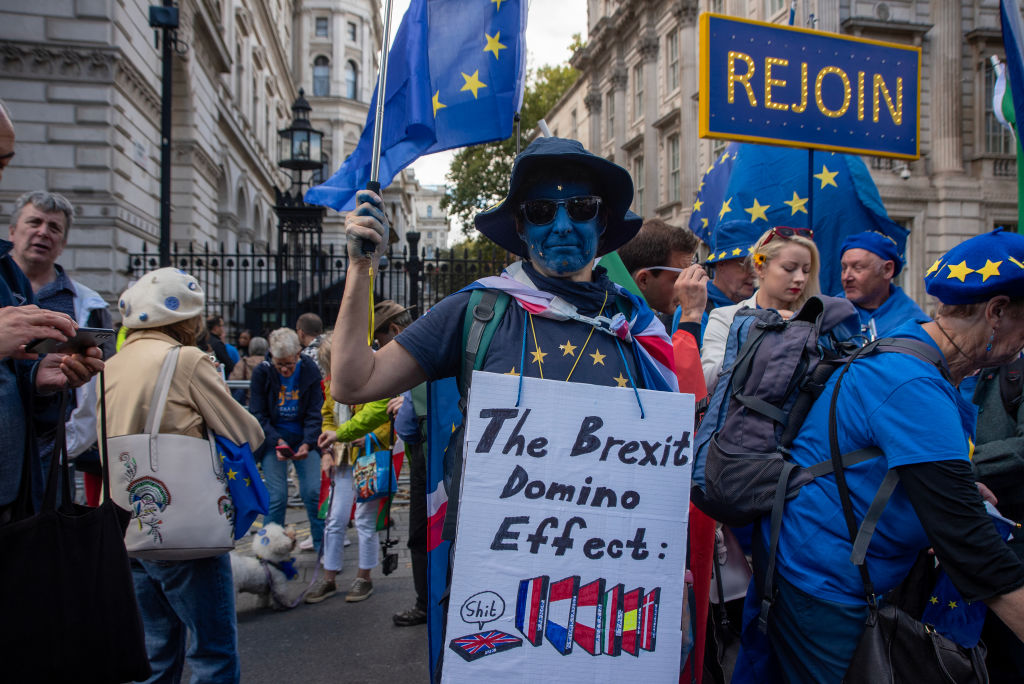LONDON – The UK’s ‘reset’ deal with the EU brought cries of “betrayal” from opponents – but that doesn’t mean those still campaigning for Brexit to be reversed were jubilant.
Reaction from Britain’s Brexiteer right – and its press – was predictable. But less obvious was how the deal would go over with those who regret leaving the EU – who, per YouGov polling released on Tuesday, now make up 56% of Brits, compared to 32% who think the right call was made.
Many, including just about every business group except fishermen, were broadly pleased at the prospect of reduced barriers after Monday’s agreements. But at the gates of Downing Steet that afternoon, where Prime Minister Keir Starmer lives and works, a small group of demonstrators was underwhelmed.
They were not replete in British red-white-and-blue – but in blue t-shirts and berets emblazoned with the 12 golden stars of the EU flag.
They were Grassroots for Europe, a campaign group whose mission, per their website, is to facilitate rejoining the EU “as soon as possible”. They had come to London to, as Colin Gordon put it, “show that the British public are fed up to the back teeth with Brexit.”
The deal, Starmer repeated, kept the UK’s well-known Brexit red lines intact: no return to the single market, no customs union, and no freedom of movement
So were they disappointed? “It’s a start,” Gordon said. But the deal would make only “marginal” difference on the economy, which he saw as Brexit’s main cost.
Steve Rouse, founder of pro-EU troupe Dance Europa – whom even Brexit architect Nigel Farage has praised for their high-octane street performances – felt similarly, though added Starmer had shown “some courage” in his reset. He hoped Britain would eventually “choose joy and friendship over resentment and division.”

Make Brexit work?
Boris Johnson won a 2019 election landslide on a campaign to “Get Brexit Done”. Starmer initially backed a controversial second referendum, but after assuming the Labour leadership in 2020 vowed to “make Brexit work.”
Monday’s reset deal saw some parts of Johnson’s Brexit overwritten. But unlike the tabloids, the demonstrators weren’t convinced Starmer would ever Get Brexit Undone.
“If it’s all ‘make Brexit work’ and the British public lose interest [in rejoining], then we’ll be left in a grey no man’s land, which would be silly,” Rouse said.
Nick Harvey, an ex-Liberal Democrat MP who served in David Cameron’s coalition government alongside many eventual Brexiteers, found the ‘make Brexit work’ mantra “inherently flawed”.
The plans to converge on food and energy were “really worthwhile” said Harvey, who is now CEO of European Movement UK, the British branch of the well-known federalist pressure group. But “it was a pity that so much was just agreement in principle, rather than detailed agreement.”
“It is a tiny step towards eventual rejoining,” he added. Like the demonstrators, reversing Brexit is part of European Movement UK’s mission, per their website.
A nearly two-hour debate on the deal in parliament on Tuesday saw the word ‘rejoin’ mentioned just three times, however – despite Harvey’s estimate that “roughly 85%” of MPs voted remain. “There would be parliamentary support for going much further than the deal, but it will take time,” he said.
Another highly pro-EU constituency is British youth – who, after Monday’s deal, may soon see the revival of Erasmus exchanges to the continent. Most Britons under 30 were too young to vote in 2016, while most over 65s voted to leave.
“Young Brits deserve the same chances enjoyed by most of their peers across the continent,” Alfred Quantril, president of European Movement UK’s youth wing, told Sky News.
But the generational divide does not always hold. Magdalena Williams, a retired civil servant and rejoin activist who was with the Downing Street demonstration, said she was happy with the deal because, “to tell you the truth, I didn’t expect an awful lot.”
“But, of course, it’s never enough for me because time is flying. I am not getting younger.”
(aw)
